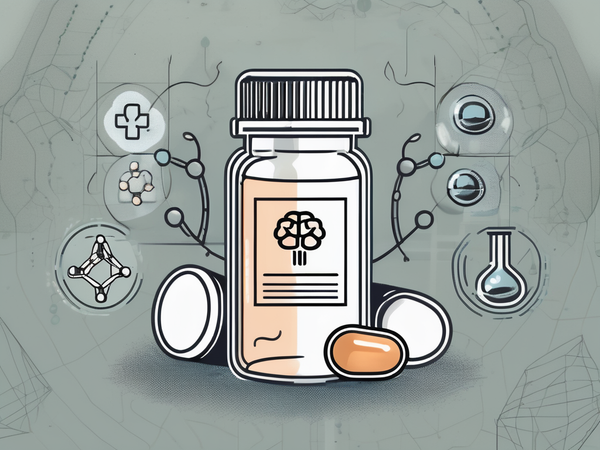In a world that often glorifies busy lifestyles and relentless productivity, it's easy to overlook the significance of our mental health. However, our mental well-being is just as crucial as our physical health. World Mental Health Day 2023, serves as a reminder that mental health matters and that we should prioritize it. Let’s explore some essential signs that indicate you need to pay attention to your mental health and delve into how certain nutrients can play a role in managing mental health issues.
Signs That You Need to Pay Attention to Your Mental Health
1. Persistent Sadness or Anxiety:
Feeling down or anxious occasionally is normal, but when these feelings persist for an extended period without an identifiable cause, it could be a sign of an underlying mental health issue such as depression or an anxiety disorder.
2. Changes in Sleep Patterns:
Insomnia or oversleeping can indicate stress or mental health problems. Difficulty falling asleep, waking up frequently at night, or excessive daytime sleepiness may warrant attention.
3. Less energy:
You might feel weak and fatigued during the day. It could be because of stress, less sleep, or poor nutrition, all of which are in some way or another influenced by your mental well-being.
4. Social Withdrawal:
If you find yourself withdrawing from social activities, avoiding friends or family, or feeling disconnected from others for an extended period, it might be time to evaluate your mental well-being.
5. Irritability and Mood Swings:
Unexplained irritability, frequent mood swings, or outbursts of anger can be manifestations of underlying mental health concerns, especially when they disrupt daily life.
6. Difficulty Concentrating:
Struggling to concentrate, make decisions, or remember things can be indicative of various mental health conditions, including anxiety, depression, or attention disorders.
7. Changes in Appetite and Weight:
Significant changes in appetite, resulting in unintended weight loss or gain, can be related to mental health issues. Some individuals may overeat as a way to cope with emotional distress, while others may lose their appetite.
8. Physical Symptoms:
Mental health problems can manifest as physical symptoms, such as frequent headaches, digestive issues, or unexplained aches and pains. These symptoms may not respond well to medical treatment because their root cause is psychological.
9. Substance Abuse:
An increased reliance on drugs or alcohol as a means of coping with emotional difficulties can be a clear sign of underlying mental health concerns. Substance abuse often masks deeper issues and may exacerbate them.
10. Thoughts of Self-Harm or Suicide:
If you ever have thoughts of self-harm or suicide, it's essential to seek help immediately. These are urgent signs of a mental health crisis that require immediate attention.
11. Reduced Interest in Activities:
Losing interest in activities that once brought joy or a sense of purpose could indicate a mental health issue. This can be especially concerning if it leads to isolation and a lack of engagement with life.
The Role of Nutrients in Managing Mental Health
Nutrition plays a vital role in overall health, and it has a significant impact on mental well-being. While proper nutrition isn't a replacement for professional mental health care, it can complement and support mental health management. Here are some nutrients that have been associated with mental health benefits:
1. Omega-3 Fatty Acids:
Omega-3 fatty acids, found in fatty fish (like salmon and mackerel), flaxseeds, and walnuts, have been linked to improved brain health and reduced symptoms of depression and anxiety. These essential fats are crucial for brain health and function. Omega 3 supplements are very popular among all age groups, considering the range of benefits they offer. You can also try to hop on the bandwagon and help your brain to some ease.
2. Vitamin D:
A deficiency in vitamin D has been associated with an increased risk of mood disorders like depression. Exposure to sunlight and dietary sources like fortified foods or vitamin D3 supplements can help maintain adequate vitamin D levels.
3. B Vitamins:
B vitamins, including B6, B9 (folate), and B12, play essential roles in brain health. Deficiencies in these vitamins, especially vitamin B12, have been linked to mood disorders. Foods like leafy greens, legumes, and lean meats are good sources of B vitamins. Additionally, you can try Vitamin B12 strips or multivitamin capsules containing B vitamins.
4. Probiotics:
Emerging research suggests that the gut-brain connection plays a significant role in mental health. Probiotics, found in fermented foods like yogurt and kefir, may support a healthy gut microbiome, which can influence mood and cognitive function.
5. Amino Acids:
Amino acids like tryptophan are precursors to neurotransmitters like serotonin and dopamine, which play crucial roles in mood regulation. Including sources of these amino acids in your diet, such as turkey, chicken, and dairy products, can be beneficial.
6. Herbal Supplements:
Some herbal supplements, such as St. John's Wort and lavender, have shown promise in alleviating stress and anxiety and promoting focus and alertness. However, it's essential to consult with a healthcare professional before using herbal remedies, as they may interact with other medications. Additionally, you can try herbatonin supplements that give you restful sleep by working with your body’s natural mechanisms. A thing to note is that sleeping supplements with herbatonin and other herbal ingredients aren’t addictive like sleeping tablets and can be taken safely on a daily basis as well.
Wrapping Up
World Mental Health Day 2023 serves as a reminder that our mental well-being deserves attention and care. Recognizing the signs that indicate you may need to pay attention to your mental health is the first step toward seeking help and support. While nutrients and a balanced diet can play a supportive role in managing mental health, it's crucial to remember that they are not a substitute for professional mental health treatment. If you or someone you know is struggling with mental health issues, contact a mental health professional for guidance and support. Mental health matters and there is help available for those in need.
References:
https://www.unicef.org/jordan/stories/mental-health-warning-signs-and-when-ask-help
https://www.health.harvard.edu/topics/mental-health
https://www.ncbi.nlm.nih.gov/pmc/articles/PMC4728667/
https://www.health.harvard.edu/diseases-and-conditions/the-gut-brain-connection
https://www.sciencedirect.com/science/article/abs/pii/S0091743512004616




























